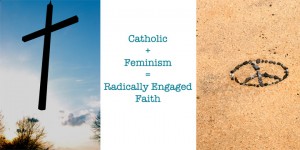Cross-posted at Xavier University’s Dorothy Day Center for Faith and Justice Blog
There are a million things I’d rather be than a Catholic Feminist.
It was a gnawing and haunting restlessness that pursued my conscience like a ravenous lioness. It was relentless. And once I acknowledged it, it was like pressing UNMUTE on the button of life. I could not deny the pattern that was emerging from my life experiences, reflections, and work. Personal, professional, familial, academic, spiritual – the thread punctured all layers of my conscience.
The something was the ungodly needle of gender oppression. It began quietly, observing theory and famous authors with a gender issues bent, like studying Wollstonecraft at Xavier. And then it became visceral holding the hands of sexual assault survivors while doctors performed a rape kit on them at 3am in an emergency room during my Jesuit Volunteer Corp experience. While studying trauma and pathology in graduate school, I took a feminist theology class at Harvard that ripped down every door that I thought was securely nailed to the hinge. Then I found myself listening to stories of female college students selling their bodies to pay for tuition. Then I found myself hotly negotiating paid time off, benefits, and maternity leave in preparation to give birth to my son. With each passing year of my adult life, I saw that the world more clearly. And I saw that it spun on an axis that disproportionately distributed violence, poverty, and disadvantage to women and girls, especially women and girls of color.
It was right around the time when in the morning I was trying to convince a suicidal grandmother to report her two person sexual assault and later that same afternoon was dodging spitballs from high school boys sneering at my lectures about power and sexuality that I realized for the umpteenth time that the world was deeply problematic. But that deeply problematic realization quickly morphed into a deeply inconvenient epiphany when it hit me that I was partitioning my faith from the rest of the world instead of using it as a tool to help heal it.
The separation of faith and feminism was a futile, self-serving, psycho-segregation act. How does one reconcile feminism – distraughtly misunderstood movements with a history of both progress and digression – with Catholicism – a distraughtly misunderstood institution that has danced on both floors of social justice and injustice? I know how labels work. In today’s water cooler conversations, use the descriptor “modern Catholic” or “contemporary feminist” and see how long it takes before someone utters a negative stereotype about feminists (male-bashing, abortion loving radicals) or Catholics (gay-hating, scandal cover-up hypocrites). Watch how quickly and thoroughly ignorance washes their thoughts, as quickly as the water they drink. Watch how quickly the opportunity to engage disappears because of preconceived notions with their cultural attributes rather than remaining open to the person holding them.
In these early days of March, Women’s Herstory Month, it is easy to be caught up in media headlines and sound bytes which profile fantastic activists of the past, scholars and philosophers with visionary quotes about equality and human rights. I celebrate this as well, but I also want more. I want liberation.
Engaging and critiquing both the women’s rights movements and the Catholic Church has birthed a perspective to view the chaotic world; a way to organize thoughts, probe issues, and build a more critical and relevant conscience for the 21st century.
It is only through profound empathy and solidarity with the least in society that Catholic feminism resonates. It is a holy call to education; to unravel racism, transform violence, and challenge systematic oppression. Understanding the role of gender in the assignment of privilege, punishment, and power in the world is one of the most urgent and rudimentary calls of Catholics today. Our faith is bolstered, not weakened by feminist praxis, and feminist methodologies must more deeply embrace the spiritual gifts of their activists, not shun them in fear of conservative religious propaganda. And though some might argue there are fundamental differences between the two that prohibit peaceful co-habitation, I would kindly offer this experiment:
Find five active Catholics and five active feminists. Put them in a room for one hour and ask them one by one to articulate their vision of liberation, of radical love in the world. I believe they would have much more in common than one might guess. Their rhetoric and politics may seem incongruent, but is the point of progression to achieve same opinion or a better outcome than the present?
